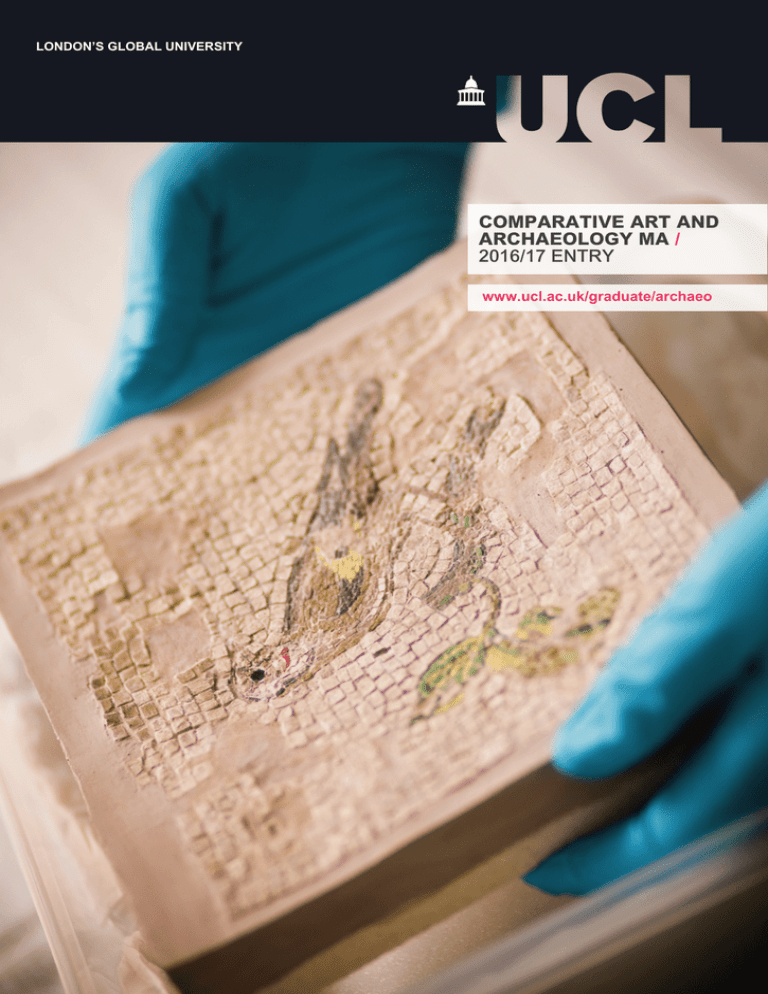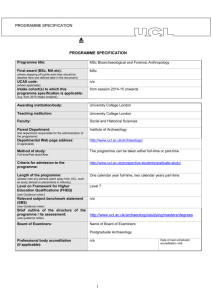COMPARATIVE ART AND ARCHAEOLOGY MA / 2016/17 ENTRY
advertisement

LONDON’S GLOBAL UNIVERSITY COMPARATIVE ART AND ARCHAEOLOGY MA / 2016/17 ENTRY www.ucl.ac.uk/graduate/archaeo Comparative Art and Archaeology MA / The Comparative Art and Archaeology MA at UCL is a wide-ranging and challenging programme designed to provide students with a sophisticated understanding of the major problems, theories and approaches in the sociological and anthropological interpretation of the art of pre modern societies. Degree structure Mode: Full-time: 1 year; Part-time: 2 years Students undertake modules to the value of 180 credits. The programme consists of one core module (30 credits), optional modules (60 credits) and a research dissertation (90 credits). CORE MODULES Degree summary // Students are encouraged to think critically and work independently in a broadly comparative perspective across the boundaries of regional and period specialisation which have traditionally characterised the study of art. They develop subject-specific, research-oriented skills relevant to their development as practising analysts within the history, anthropology or archaeology of art. // Ancient Italy in the Mediterranean // Archaeology of Buddhism // Archaeology of Egypt and the Near East: a Comparative Approach // Aztec Archaeology: Codices and Ethnohistory // Cities, States and Religion // Making and Meaning in Ancient Greek Art The UCL Institute of Archaeology is the largest and most diverse department of archaeology in the UK, and provides a stimulating environment for postgraduate study. // Making and Meaning in Ancient Roman Art // Maya Art, Architecture and Archaeology // The Mediterranean World in the Iron Age We are international in outlook, with students and staff from over 40 countries, and involvement in field research projects around the globe. The teaching staff for this programme bring together a range and depth of expertise that is arguably unparalleled at other institutions. // Society and Culture in Ancient Egypt // World Rock Art: from Palaeolithic to Present // Language, History and Archaeology courses available with UCL // Social Complexity in Early China: from the Neolithic to the Early Empire // Other options available through the University of London (i.e. SOAS, Kings) may be taken // // // UCL is located in central London, within walking distance of the British Museum and the British Library. UCL's own museums and collections form a resource of international importance for academic research. The programme is delivered through a combination of seminars, lectures and presentations. Some optional modules include site visits to museums. Assessment is through essays, coursework, oral examination and the dissertation. Art: Interpretation and Explanation OPTIONS DISSERTATION/REPORT // All MA students undertake an independent research project which culminates in a dissertation of 15,000 words. Your career Some recent graduates of the programme haveprogressed to PhD studies while others have developed careers in museums, other professional cultural heritage organisations, as well as art and archaeology-related publishing and television. A high level of success has been achieved by students going on to fully funded PhD research at the University of Oxford, UCL, University of California Berkeley, and Stanford, funded by the AHRC, the Chilean government, Japanese Government, UCL and the Ministry of Education of Taiwan. Other students have secured positions in the museums and heritage sector, for example at the Petrie Museum at UCL and the Museum for Asian Civilizations in Singapore. Recent career destinations* include: // // // UCL, PhD student University of Oxford, PhD student, 2011 University of California, Berkeley, PhD student, 2014 Employability Successful graduates will have been fully prepared to undertake research on the art history and archaeology of early civilizations, from a comparative or region/period/theme-specific perspective, and will also possess the expert background knowledge to move on to related professional work in art history, archaeology and cultural heritage (subject to the particular requirements of a given position). * data taken from the ‘Destinations of Leavers from Higher Education’ survey undertaken by HESA looking at the destinations of UK and EU students in the 2010–2012 graduating cohorts six months after graduation and, where necessary, departmental records. Entry requirements A minimum of an upper second-class Bachelor's degree in a relevant subject from a UK university or an overseas qualification of an equivalent standard. FEES AND FUNDING // UK & EU (2016/17) entry: £9,020 (FT) // Overseas (2016/17) entry: £18,670 (FT) // UK & EU (2016/17) entry: £4,510 (PT) English language proficiency level // Overseas (2016/17) entry: £9,285 (PT) If your education has not been conducted in the English language, you will be expected to demonstrate evidence of an adequate level of English proficiency. UK and EU students are eligible to apply for Arts and Humanities Research Council funding. The level of English language proficiency for this programme is: Good. A small number of IoA Masters Award bursaries, normally in the region of £1,000, are available each year. Information about the evidence required, acceptable qualifications and test providers is provided at: www.ucl.ac.uk/graduate/english-requirements Full details of funding opportunities can be found on the UCL Scholarships website: www.ucl.ac.uk/scholarships Your application The deadline for all applicants is 29 July 2016. Students are advised to apply as early as possible due to competition for places. Those applying for scholarship funding (particularly overseas applicants) should take note of application deadlines. When we assess your application we would like to learn: // why you want to study Comparative Art and Archaeology at graduate level // // // why you want to study Comparative Art and Archaeology at UCL // where you would like to go professionally with your degree what particularly attracts you to this programme how your personal, academic and professional background meets the demands of a challenging academic environment Together with essential academic requirements, the personal statement is your opportunity to illustrate whether your reasons for applying to this programme match what the programme will deliver. Details on how to apply are available on the website at: www.ucl.ac.uk/graduate/apply PDF Updated: May 25, 2016 Information correct at time of going to press. See website (www.ucl.ac.uk/archaeology) for latest information APPLICATION DATE All applicants: 29 July 2016 CONTACT Professor Andrew Reynolds Email: ioa-gradadmissions@ucl.ac.uk Telephone: +44 (0)20 7679 7495

